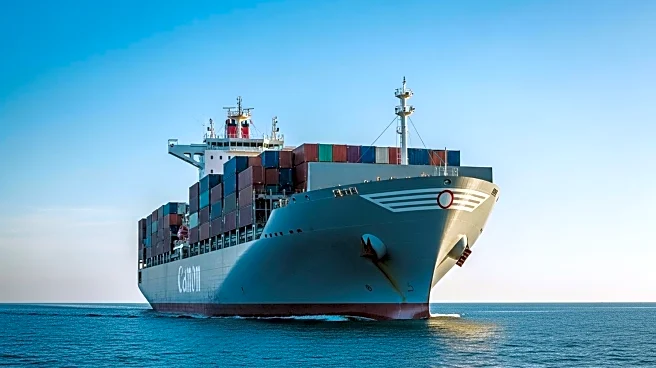What's Happening?
MSC, a Swiss-based shipping company, has been identified as the owner of the most valuable container fleet globally, with assets valued at $49.6 billion. According to data from VesselsValue, MSC's fleet comprises 707 vessels, including 584 active ships and 125 on order. The company has heavily invested in Ultra Large Container Vessels (ULCVs), which make up a significant portion of its order book. The fleet's value has increased due to rising prices in the container vessel market, particularly for older ships. MSC's strategic focus on expanding its fleet with modern, efficient vessels positions it as a leader in the shipping industry.
Why It's Important?
MSC's dominance in fleet value underscores its significant role in the global shipping industry, impacting trade and logistics worldwide. The company's investment in ULCVs reflects a strategic move to enhance capacity and efficiency, catering to growing demand for container shipping. This development is crucial for global supply chains, as MSC's fleet expansion can influence shipping rates and availability. The emphasis on modern vessels also aligns with industry trends towards decarbonization and improved energy efficiency, addressing environmental concerns and regulatory requirements.
What's Next?
MSC is expected to continue expanding its fleet, with new vessels entering service in the coming years. This growth may lead to increased competition in the container shipping market, potentially affecting pricing and service offerings. As MSC integrates these new ships, it will likely focus on optimizing operations and maintaining its leadership position. The company's actions may prompt other shipping firms to accelerate their own fleet upgrades, contributing to industry-wide advancements in technology and sustainability.
Beyond the Headlines
The rise in fleet value highlights broader trends in the shipping industry, including the shift towards larger, more efficient vessels. MSC's focus on ULCVs may drive innovation in ship design and construction, influencing future developments in maritime technology. Additionally, the company's leadership in fleet value could impact global trade dynamics, as efficient shipping solutions become increasingly critical for economic growth and international commerce.









